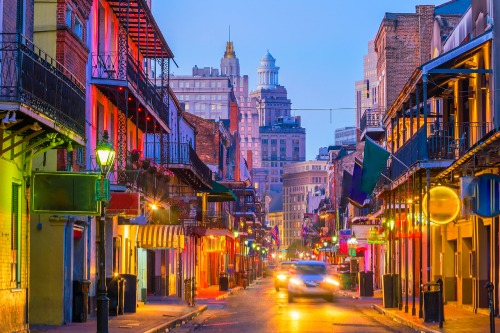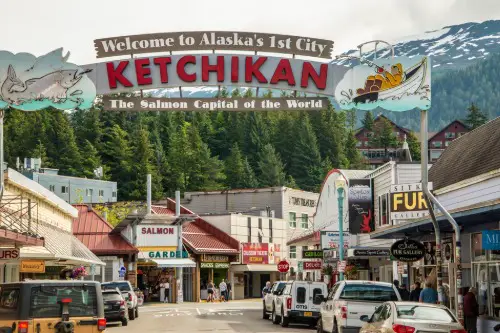1. Oklahoma

Oklahoma and Texas share a long history of rivalry that can be traced back to the 1800s. In the early days, Texas was a republic and viewed Oklahoma’s territories as part of its larger ambition to expand. When Oklahoma became a state in 1907, tensions continued, The Oklahoman explains. The rivalry became particularly intense on the football field, where Oklahoma and Texas fans are some of the most passionate in the country. The annual “Red River Showdown” between the University of Oklahoma and the University of Texas is a major event in the state, often escalating regional pride and fierce competition.
But the disdain runs deeper than just sports. Many Oklahomans view Texans as arrogant and too focused on their own identity. Texans often adopt a “bigger is better” mentality, whether it’s in terms of land, business, or even personality. Oklahoma residents, on the other hand, tend to be proud of their laid-back attitude and “smaller, friendlier” approach to life. This clash of cultural identities often makes the relationship tense, despite the fact that they are geographically neighbors.
2. Louisiana

Louisiana and Texas have always had a healthy, but sometimes strained relationship. The two states have an interesting history, with Louisiana’s French roots in stark contrast to Texas’s Anglo-Saxon influences. One of the key sources of tension stems from the competition between the states’ economies, especially in the energy sector. Louisiana’s oil-rich Gulf Coast often faces off with Texas in both fishing and oil drilling industries. This results in subtle jealousy and, at times, frustration between the two.
On a cultural level, there are also differences that make these states somewhat antagonistic. Louisianans often embrace their Creole and Cajun roots, making them feel distinctly different from the more “Texan” culture, which has a strong emphasis on cowboy traditions, BBQ, and country music. Texans often have a reputation for being dismissive of anything that doesn’t fit their own image of “American pride,” and that can rub Louisiana residents the wrong way, especially when it comes to their unique history and heritage.
3. New Mexico

New Mexico and Texas are natural neighbors, but not always natural allies. According to a KRQE article, New Mexicans have a “unique hatred” for Texans. This tension has its roots in both history and geography. After Texas gained independence from Mexico in 1836, the state’s borders were fiercely contested. New Mexico, which had once been part of Mexico, became part of the United States through the Treaty of Guadalupe Hidalgo, and tensions flared when both Texas and New Mexico staked claims to areas like the disputed land along the Rio Grande.
New Mexicans often feel that Texans are overbearing, coming into their state with a sense of entitlement and superior knowledge. The “Texas” mentality can feel like a kind of cultural invasion to New Mexicans who pride themselves on their distinct, multi-cultural identity that blends Native American, Hispanic, and Anglo cultures. This contrast creates an underlying animosity, especially since Texas has such a dominant presence in the Southwest, often overshadowing its neighbors.
4. Colorado

Coloradans and Texans are, in many ways, polar opposites. While Texas is all about wide-open spaces and big, bold personalities, Colorado prides itself on its outdoor lifestyle, progressive politics, and environmental consciousness, Medium reports. Texans, with their love of big trucks, sprawling suburbs, and traditional values, often clash with Coloradans who prefer sustainable living, mountain sports, and a more liberal approach to governance.
The rivalry is also fueled by the influx of Texans moving to Colorado in recent years, particularly to cities like Denver. Many Coloradans resent the “Texan takeover” of their state, complaining that Texans bring with them a conservative, “big business” mindset that doesn’t fit in with the progressive, environmentally conscious culture of Colorado. On the other hand, Texans sometimes feel that Coloradans are too “soft” or “liberal” for their tastes, leading to mutual disdain.
5. California

Texans and Californians have long been at odds, with each state considering themselves the “true” leader of the American West. Texas has its “bigger is better” attitude and the pride that comes with its independent spirit, while California is more liberal and progressive, especially in urban areas like Los Angeles and San Francisco. The cultural clash between Texans and Californians is most evident in the tech industry, where many Texas-born entrepreneurs flock to Silicon Valley only to face criticism from their fellow Californians about Texas’s conservative policies.
Furthermore, Texans often look at California’s high cost of living, tax structure, and politics with skepticism. Californians, in turn, frequently deride Texas for its less progressive stances on issues like environmental regulations and social policies. The rivalry can be playful, but it’s also grounded in very real cultural and ideological differences that create tension whenever the two states collide.
6. Arkansas

Arkansas and Texas have a long-standing rivalry, particularly in terms of sports and local politics. The rivalry is best seen in college football, according to Inside Arkansas, where the Arkansas Razorbacks compete with Texas teams like the Longhorns. While Arkansas isn’t as large or as influential as Texas, its residents have a fierce pride in their state, and many view Texans as overly self-assured and presumptuous.
Arkansans often feel that Texans dominate too much of the region, from its influence on local politics to its stranglehold on the economy in certain sectors. There’s also a cultural divide, with Texans often seen as overly polished and big-city focused, while Arkansans pride themselves on their rural, “down-home” lifestyle. These cultural differences make the two states occasionally feel worlds apart, despite their close geographical proximity.
7. Alaska

Alaska and Texas have a rivalry that’s rooted in both geography and culture. Texans often boast about their size and the state’s immense influence, but Alaska can claim bragging rights in both land area and natural resources. However, Alaskans don’t always appreciate the Texas-sized ego that comes with the territory, according to the Anchorage Daily News. The idea that Texas is “the best” is hard for Alaskans to swallow, especially given the state’s wild beauty, rugged terrain, and independence.
Alaskans also have a different approach to living and working, which can sometimes be at odds with Texas’s big-business mentality. Texans tend to embrace an urbanized, fast-paced lifestyle, while Alaskans are used to the isolation and self-reliance that comes with living in one of the most remote states in the country. The cultural gap is significant, and while both states are proud of their independence, that pride often manifests in different ways.
8. Montana

Texans and Montanans often find themselves at odds due to their vastly different lifestyles. While Texas is known for its urban centers, sprawling suburbs, and high-energy culture, Montana is all about wide-open spaces, rugged individualism, and a slower pace of life. Texans are sometimes seen as “too much” by Montanans, especially when they bring their big personalities and louder-than-life attitudes to the peaceful, quiet environment of Montana.
Moreover, Montanans tend to view Texas’s influence over the national political scene with skepticism. While Texas is a powerful force in American politics, Montana prides itself on being more independent, with a strong libertarian streak. The two states’ differing attitudes towards government and regulation only deepen their divide.
9. Wyoming

Wyoming, like Montana, values its independence, and its residents aren’t always thrilled when Texans come through, bringing their bigger-than-life mentality along with them. While Texas is known for its wealth, status, and prominence, Wyoming residents pride themselves on their quiet, hardworking values. Wyoming is a place where ranching, conservation, and outdoor recreation define the culture, and there’s often a sense that Texans are too “flashy” or materialistic for Wyoming’s simpler way of life.
Additionally, Wyoming and Texas share industries like oil and gas, but Wyoming doesn’t always feel that Texans have a genuine interest in preserving the state’s unique way of life. There’s a sense that Texans may view Wyoming as just another place to expand their business, without understanding or respecting the state’s deep connection to its land and traditions.
10. Minnesota

Minnesota’s relationship with Texas is complicated by a cultural divide that makes it hard for the two states to find common ground. Minnesotans tend to have a reputation for being polite, reserved, and community-focused, whereas Texans are often seen as bold, brash, and a bit too self-assured. This difference in demeanor can lead to misunderstandings, with Minnesotans sometimes viewing Texans as arrogant or overly proud of their state.
On the flip side, Texans may see Minnesotans as overly cautious or even passive, which clashes with their more go-big-or-go-home mentality. This tension is also reflected in their political differences, with Texas being a more conservative state and Minnesota being known for its progressive values. These contrasts can create an underlying unease whenever the two states are brought into conversation.
11. Nevada

Nevada’s relationship with Texas is largely shaped by two factors: competition for tourism and the city of Las Vegas. Texans are known to flock to Las Vegas in droves, especially for events like the National Finals Rodeo and major concerts, but many Nevadans don’t particularly like being overwhelmed by the crowds of tourists from the Lone Star State. The perception among some Nevadans is that Texans are loud, boastful, and unrefined, which can clash with the more laid-back vibe of Nevada’s local culture.
There’s also tension in the way each state manages its economy. Texans tend to be proud of their business-friendly, low-tax policies, while Nevadans often highlight the state’s focus on entertainment and tourism. The competition between these two industries can sometimes feel like an unspoken rivalry, especially when Texans start to make their mark in Nevada’s traditionally unique sectors.
12. Illinois

Illinois and Texas are both powerhouses in the U.S., but their rivalry is mostly rooted in politics and sports. Chicago, a liberal stronghold, often finds itself at odds with Texas’s conservative reputation. While Illinois tends to lean heavily Democrat, Texas is a Republican stronghold, and this contrast frequently sparks friction when national politics come into play. Texans, proud of their conservative values, often criticize Illinois’s higher taxes and regulatory policies, while Illinois residents are quick to point out the social issues they see as pervasive in Texas.
On a more personal level, Texans often view Illinois as cold—both literally and figuratively—while Illinoisans view Texans as overly brash and fond of self-aggrandizing rhetoric. This animosity spills over into college sports and national debates, making it hard for these two states to agree on much, even if they share a passion for politics and the American Dream.


